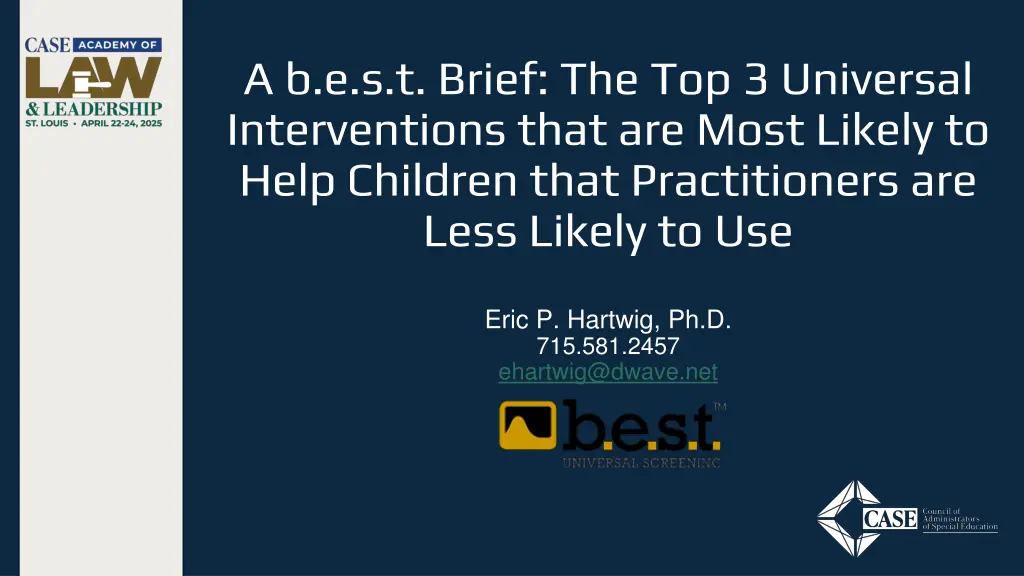
Effective Universal Interventions for Children: Building Relationships and Self-Regulation
Discover the top 3 universal interventions practitioners often overlook but can greatly benefit children: relationship-informed teaching, building connections, and self-regulation skills. Explore deliberate practices to enhance child well-being and academic success through emotional and behavioral regulation strategies.
Download Presentation

Please find below an Image/Link to download the presentation.
The content on the website is provided AS IS for your information and personal use only. It may not be sold, licensed, or shared on other websites without obtaining consent from the author. If you encounter any issues during the download, it is possible that the publisher has removed the file from their server.
You are allowed to download the files provided on this website for personal or commercial use, subject to the condition that they are used lawfully. All files are the property of their respective owners.
The content on the website is provided AS IS for your information and personal use only. It may not be sold, licensed, or shared on other websites without obtaining consent from the author.
E N D
Presentation Transcript
A b.e.s.t. Brief: The Top 3 Universal Interventions that are Most Likely to Help Children that Practitioners are Less Likely to Use Eric P. Hartwig, Ph.D. 715.581.2457 ehartwig@dwave.net
One: Relationship Informed Teaching Matters Building Relationships Relationship-based people tend to exhibit identifiable personal-social traits. Broadly characterized by a warm, caring and democratic attitude. This warmth and responsiveness tends to focus on the needs of others. 2
Relationship Informed Connections Matter Sustained patterns of relationship development are manifested by: Caring relationships, wellness-promoting routines and practices. Relationships cannot be just Inoculations. There must be deliberate practice with sustainability. Adults must be accessible to help when children are distressed. Children have to be able to feel safe and be safe as they connect with others. 3
What We Can Learn and Teach in Our Relationship Quest? Cognitive self-regulation Focused attention, executive functioning (i.e., cognitive flexibility, mental shifting) We learn and practice Self-monitoring, attributions and appraisals of others. 4
Emotional self-regulation An awareness and understanding of feelings. Actively managing strong and unpleasant feelings. Adaptive functioning in emotionally arousing situations. We learn and practice Self-calming strategies and tolerance and/or management of internal distress. 5
Behavioral self-regulation We learn and model how to follow rules, delay gratification, increase persistence, mediate impulse control. We learn and practice Conflict resolution, enactment of active coping strategies. To focus on goal-oriented behaviors (e.g., organizing time to complete tasks 6
Five Deliberate Practices to Consider Decrease Anonymity We open the cage and the bird flies out Two by Ten (2x10) Check In/Check Out the b.e.s.t. Way Create an emotional tether Connect the Dots Oslo Effect Wag More Bark Less 7
Two: Reflections of Feelings Reflection and Listening - Internalizing There is a difference between Sympathy and Empathy. 8
Three: Descriptive Feedback/Noncontingent Reinforcement Non-contingent Descriptive Feedback Shaping: Extrinsic to Intrinsic Rx 9
Summary/Review Positive Practice 1. Building Relationships with Positive Personal Regard 1. How to Really Listen 1. Reflection of Feelings 1. Descriptive Feedback PRACTICE 10
